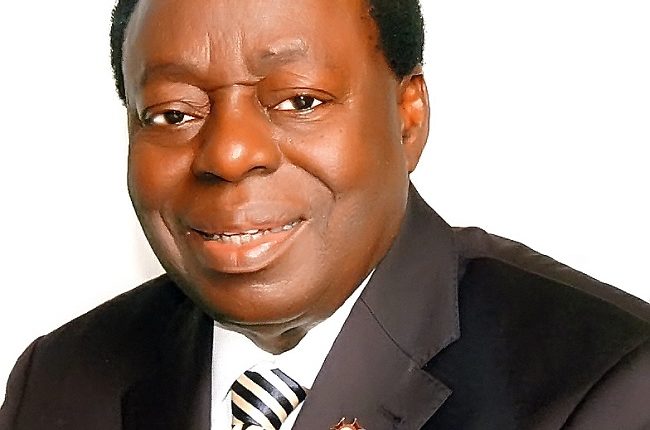DANGOTE REFINERY: Sandwiched Between Plenty and Want (2), By Afe Babalola

NIGERIA has produced 236 million barrels of crude this year, yet it is unable to supply the 650,000 barrels per day needed by Dangote Refinery and Petrochemicals company to run at full capacity.
Consequently, Dangote had to source for crude oil elsewhere, thereby increasing the cost of production.
Some of the factors responsible for these as discussed in the first part of this publication are Nigeria’s widening appetite for oil-backed loans, the reluctance of the International Oil Companies, IOCs, to sell to local refineries and Nigeria’s dependence on crude oil as the only source of generating foreign exchange.
However, these are not an exhaustive list of the ills that caused the failure of Nigeria to supply adequate crude oil needed for running the Dangote Refinery at full capacity.
Other factors that have caused the unavailability of crude oil for the Dangote Refinery are:
1. Nigeria’s crude for oil swap: From 2016, Nigeria adopted the crude for oil swap practice. This is when Nigeria gives crude to international traders who export same and supply refined oil in its stead. Hence, the Federal Government need not pay if the crude covers the price of the supplied refined oil. The practice adopted by Nigeria is the Government-to-Government sale, or direct sale and direct purchase, DSDP. However, to facilitate the sale, Nigeria has to execute agreements with companies who will transport the crude. The Nigerian government is entitled to only 40% of the crude explored by the multinationals in Nigeria. This brings the figure to about 450,000 to 455 000 bpd. Nigeria exchanges 450,000 barrels of crude oil per day for approximately 1.34 billion litres of PMS. Hence, one month’s swap will provide enough PMS for the nation at the current consumption rate. The question is: if Nigeria has been involved in crude for oil swap since 2016, why does the government still need to import PMS and pay subsidy on them?
Nigeria is said to have engaged in crude for oil swap this year. The extent of this practice is however not generally available since Nigeria ought to have stopped the crude for oil swap since June 2023.
2. Reluctance to terminate the lucrative subsidy scam: on May 29, when President Bola Tinubu delivered his inaugural speech, he announced that “fuel subsidy is gone”. This led to the immediate rise in the price of petrol. The removal of fuel subsidy increased the prices of basic commodities which led to unprecedented inflation in Nigeria. However, when the landing cost of petroleum at the port increased, the government was forced to bring back subsidy, albeit subtly. Within the month of July 2024, the landing cost of crude oil is about 1,117 per litre as revealed by the Independent Petroleum Marketers Association of Nigeria.
Currently the Federal Government spends above N700 billion on subsidy for PMS monthly. Whereas the intention of the Federal Government may be presumed sincere, the subsidy scheme has also been used by many to defraud the nation. Alhaji Aliko Dangote revealed that some persons in the NNPC have blended plants abroad. They, therefore, profit immensely from importing their own products which are claimed to be inferior, and also reaping from the subsidy scheme.
In addition, Nigeria still practices crude for oil swap. Hence, the oil consumed are meant to be subsidy free. This is not the case.
Several billions of dollars had been spent over the years from government coffers in the guise of using them to revitalise refineries. However, these refineries have not produced a single drop of oil. Rather, concerted efforts are diverted towards the importation of PMS and the payment of subsidy on the imports, some of which never reach the shores of Nigeria. If Dangote’s huge refinery functions fully I believe that it will bring an end to our oil problems.
It is obvious that the rot and corruption in the oil sector of the Nigerian economy runs very deep. The Senate on July 22 commissioned the Senate ad-hoc committee to investigate and address the sabotage of the oil sector in the country. This is because if left unchecked, the rot and corruption in the sector will sooner than later cripple the economy. This is because the Nigeria economy is oil-dependent. All Nigerians are waiting anxiously for the outcome of the Senate investigation.
◼️ Dangote and the rest of the world
Dangote Refinery has turned to international markets to curb the dearth in the availability of crude oil in Nigeria. So far, Dangote Refinery has concluded arrangements to import nine million barrels of crude oil from the USA and is set to import 11 million barrels more. It has also concluded deal to import one million barrels of crude oil from Brazil and has plans in motion to purchase from Angola, Senegal and Libya.
The Federal Government has, however, promised that there would be sustainable supply of crude oil to local refineries. The Nigerian Upstream Petroleum Regulatory Commission, NUPRC, has insisted that IOCs meet local demands first, before exporting to other African countries. Whether these promises will translate to crude availability in local refineries is the concern. This is because Nigeria has very little say on what the IOCs with their own oil and the NNPC’s share is not sufficient to supply local refineries.
◼️ Conclusion
In view of the revelation above, it is not surprising that Dangote Refinery and Petrochemicals Plant suffers lack amidst plenty. It is, however, puzzling that Nigerians are not asking the right questions on how the wealth of the country is spent, especially since all the figures needed are available on the internet. Countries like Qatar, the United Arab Emirates, Iran, Russia, Saudi Arabia, China and the United States of America have used proceeds from crude oil exploration and refining to bolster their national economies. However, the same natural resources have been very loosely labelled as a “curse” to Nigeria.
The Nigerian crude industry made above $394 billion from 2011-2022. Nigeria’s total debt is $108.23 billion.
The implication is that Nigeria has enough revenue to pay its debt and to build functional refineries to reduce the dependence on importation. Sadly, Nigeria cannot account for the whereabouts of all these revenues.
Also, an individual built a refinery bigger than what Nigeria could build. In 2023, Saudi Aramco (the world’s largest oil company) declared above $124 billion as dividends for its shareholders. On the contrary, the NNPC is declaring deficits and mortgaging future oil productions for immediate resources. Nigeria has a long way to go, and it starts from asking the right questions and holding the leaders accountable to the electorate.
◼️ Hope
What Dangote Refinery offers is hope. It is asking for an end to oil importation. It deserves not only encouragement but the support of every Nigerian. It is the hope of every Nigerian that its efforts should not be stifled. Instead of killing Dangote Refinery, we should encourage and support this huge investment.
ABOUT THE AUTHOR: Afe Babalola CON OFR SAN is a Nigerian lawyer and founder of Afe Babalola University, Ado Ekiti (ABUAD), Ekiti State.
#penglobaldiscourse #Dangote



